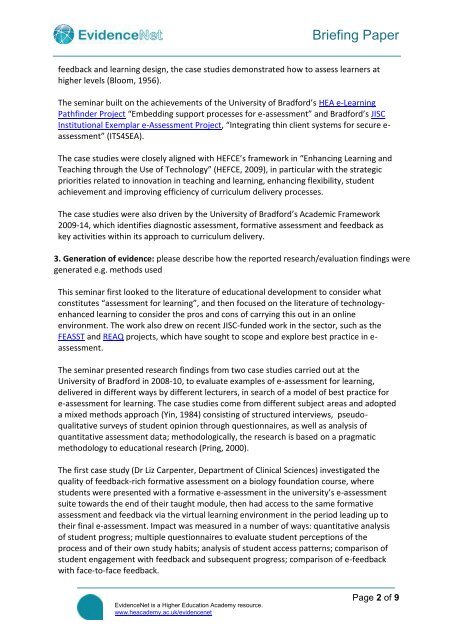10. Briefing Paper Template - Higher Education Academy
10. Briefing Paper Template - Higher Education Academy
10. Briefing Paper Template - Higher Education Academy
Create successful ePaper yourself
Turn your PDF publications into a flip-book with our unique Google optimized e-Paper software.
<strong>Briefing</strong> <strong>Paper</strong><br />
feedback and learning design, the case studies demonstrated how to assess learners at<br />
higher levels (Bloom, 1956).<br />
The seminar built on the achievements of the University of Bradford’s HEA e-Learning<br />
Pathfinder Project “Embedding support processes for e-assessment” and Bradford’s JISC<br />
Institutional Exemplar e-Assessment Project, “Integrating thin client systems for secure e-<br />
assessment” (ITS4SEA).<br />
The case studies were closely aligned with HEFCE’s framework in “Enhancing Learning and<br />
Teaching through the Use of Technology” (HEFCE, 2009), in particular with the strategic<br />
priorities related to innovation in teaching and learning, enhancing flexibility, student<br />
achievement and improving efficiency of curriculum delivery processes.<br />
The case studies were also driven by the University of Bradford’s Academic Framework<br />
2009-14, which identifies diagnostic assessment, formative assessment and feedback as<br />
key activities within its approach to curriculum delivery.<br />
3. Generation of evidence: please describe how the reported research/evaluation findings were<br />
generated e.g. methods used<br />
This seminar first looked to the literature of educational development to consider what<br />
constitutes “assessment for learning”, and then focused on the literature of technologyenhanced<br />
learning to consider the pros and cons of carrying this out in an online<br />
environment. The work also drew on recent JISC-funded work in the sector, such as the<br />
FEASST and REAQ projects, which have sought to scope and explore best practice in e-<br />
assessment.<br />
The seminar presented research findings from two case studies carried out at the<br />
University of Bradford in 2008-10, to evaluate examples of e-assessment for learning,<br />
delivered in different ways by different lecturers, in search of a model of best practice for<br />
e-assessment for learning. The case studies come from different subject areas and adopted<br />
a mixed methods approach (Yin, 1984) consisting of structured interviews, pseudoqualitative<br />
surveys of student opinion through questionnaires, as well as analysis of<br />
quantitative assessment data; methodologically, the research is based on a pragmatic<br />
methodology to educational research (Pring, 2000).<br />
The first case study (Dr Liz Carpenter, Department of Clinical Sciences) investigated the<br />
quality of feedback-rich formative assessment on a biology foundation course, where<br />
students were presented with a formative e-assessment in the university’s e-assessment<br />
suite towards the end of their taught module, then had access to the same formative<br />
assessment and feedback via the virtual learning environment in the period leading up to<br />
their final e-assessment. Impact was measured in a number of ways: quantitative analysis<br />
of student progress; multiple questionnaires to evaluate student perceptions of the<br />
process and of their own study habits; analysis of student access patterns; comparison of<br />
student engagement with feedback and subsequent progress; comparison of e-feedback<br />
with face-to-face feedback.<br />
EvidenceNet is a <strong>Higher</strong> <strong>Education</strong> <strong>Academy</strong> resource.<br />
www.heacademy.ac.uk/evidencenet<br />
Page 2 of 9

















